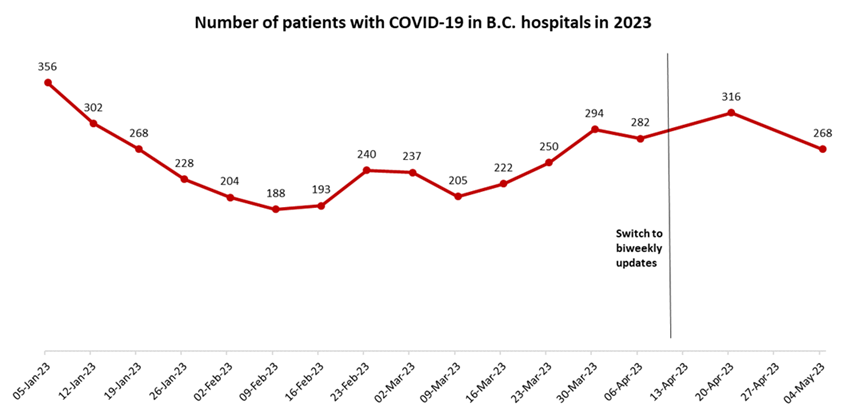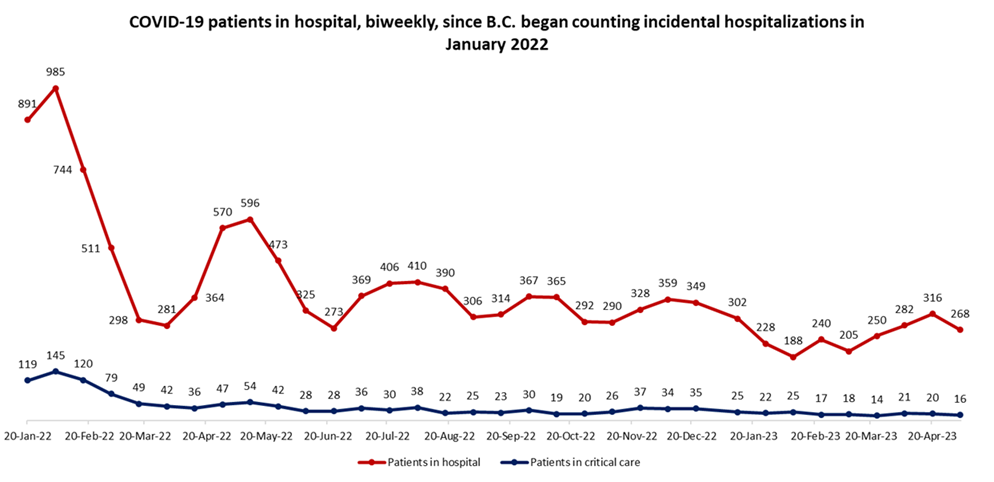BCCDC begins accounting for COVID-19 reinfections as frequency of updates reduced
 A sign at the BC Centre for Disease Control is seen in this photo from the BCCDC website.
A sign at the BC Centre for Disease Control is seen in this photo from the BCCDC website.
Six months after telling CTV News it was working to "better quantify" reinfections in its COVID-19 data, the B.C. Centre for Disease Control introduced a new counting system Thursday that will do just that.
The change comes as the BCCDC shifts to reporting COVID-19 data on a monthly basis, down from biweekly reports last month and weekly reports since April 2022.
Going forward, updates on infections, hospitalizations, deaths and other information related to COVID-19 will be published on the BCCDC website on the first Thursday of each month.
REINFECTIONS NOW COUNTED
Under the new system, the centre is tracking "infection episodes," rather than "cases" of COVID-19.
An infection episode, according to the BCCDC, is any time a person tests positive for COVID-19 on a lab-based test that is not within 30 days of a previous positive test.
This means a person who tested positive in the early days of the pandemic, recovered, and contracted the disease again this week will be counted as two separate infection episodes. Before Thursday's change, a person in that scenario would only be counted as a single case of COVID-19, because the definition of a case was tied to a person's first positive test.
In its announcement of the change, the BCCDC notes that the infection episode count still only includes lab-based tests funded by the provincial Medical Services Plan, meaning the vast majority of people who catch COVID-19 in the province will not be counted, as has long been the case.
"Due to a targeted testing strategy primarily aimed to inform patient care, the system will not capture all COVID-19 infections in the B.C. population," the BCCDC's statement reads.
"Positive results through rapid antigen tests (RAT), which became available in December 2021, are not reported to public health. While the surveillance system may not capture all COVID-19 infections, the system is able to monitor changes over time."
MONTHLY DATA UPDATES
On Thursday, the BCCDC reported that 636 "infection episodes" had been confirmed during the week of April 23 to 29.
The previous week – April 16 to 22 – saw 530 new lab-confirmed cases of COVID-19, under the old definition that excluded reinfections.
The BCCDC says direct comparisons between pre- and post-transition numbers should not be made, but a graph in its release shows "infection episodes" have generally trended higher than "cases" since April 2022.
The change in definitions also affects data on new hospital admissions, critical care admissions and deaths, though the centre's statement notes the effect is not particularly dramatic.
"One of the reasons why the impact of this system transition is small is because the vast majority of infections in B.C. are not captured through lab testing and lab testing generally reflects patients tested in health-care settings," the BCCDC said.
"Another reason is that for the vast majority of people who are hospitalized or die and have a positive COVID-19 test, it is their first test in the lab system."
There were 175 new hospital admissions for COVID-19 during the week of April 23 to 29, essentially unchanged from the previous week's 172, despite the transition to the new system.
The number of patients currently in hospital – which is different from the number of new admissions for a given week – is unaffected by the switch to counting infection episodes, the count of current hospitalizations has always been based on patients' latest tests.
As of Thursday, there were 268 people in hospital with COVID-19, a figure that includes both those with serious illness requiring hospital care and those who were hospitalized for some other reason and tested positive incidentally.
The latest total is the lowest reported since March 23, though there were only two updates in April because the BCCDC switched to biweekly reporting.
 The number of people in hospital with COVID-19 in B.C. in 2023, as reported by the BCCDC, is shown. (CTV)
The number of people in hospital with COVID-19 in B.C. in 2023, as reported by the BCCDC, is shown. (CTV)
The current hospitalization total is on the low end relative to where it has been since the BCCDC began including incidental hospitalizations in its count in January 2022.
 The number of patients in B.C. hospitals with COVID-19 is shown, on a biweekly basis, since the province began including incidental hospitalizations in its total in January 2022. (CTV)
The number of patients in B.C. hospitals with COVID-19 is shown, on a biweekly basis, since the province began including incidental hospitalizations in its total in January 2022. (CTV)
Thursday's update is the last one the BCCDC will be releasing until June 1.
CTVNews.ca Top Stories

Widow looking for answers after Quebec man dies in Texas Ironman competition
The widow of a Quebec man who died competing in an Ironman competition is looking for answers.
Amid concerns over 'collateral damage' Trudeau, Freeland defend capital gains tax change
Facing pushback from physicians and businesspeople over the coming increase to the capital gains inclusion rate, Prime Minister Justin Trudeau and his deputy Chrystia Freeland are standing by their plan to target Canada's highest earners.
World seeing near breakdown of international law amid wars in Gaza and Ukraine, Amnesty says
The world is seeing a near breakdown of international law amid flagrant rule-breaking in Gaza and Ukraine, multiplying armed conflicts, the rise of authoritarianism and huge rights violations in Sudan, Ethiopia and Myanmar, Amnesty International warned Wednesday as it published its annual report.
Photographer alleges he was forced to watch Megan Thee Stallion have sex and was unfairly fired
A photographer who worked for Megan Thee Stallion said in a lawsuit filed Tuesday that he was forced to watch her have sex, was unfairly fired soon after and was abused as her employee.
Tom Mulcair: Park littered with trash after 'pilot project' is perfect symbol of Trudeau governance
Former NDP leader Tom Mulcair says that what's happening now in a trash-littered federal park in Quebec is a perfect metaphor for how the Trudeau government runs things.
U.S. Senate passes bill forcing TikTok's parent company to sell or face ban, sends to Biden for signature
The Senate passed legislation Tuesday that would force TikTok's China-based parent company to sell the social media platform under the threat of a ban, a contentious move by U.S. lawmakers that's expected to face legal challenges.
Wildfire southwest of Peace River spurs evacuation order
People living near a wildfire burning about 15 kilometres southwest of Peace River are being told to evacuate their homes.
U.S. Senate overwhelmingly passes aid for Ukraine, Israel and Taiwan with big bipartisan vote
The U.S. Senate has passed US$95 billion in war aid to Ukraine, Israel and Taiwan, sending the legislation to President Joe Biden after months of delays and contentious debate over how involved the United States should be in foreign wars.
'My stomach dropped': Winnipeg man speaks out after being criminally harassed following single online date
A Winnipeg man said a single date gone wrong led to years of criminal harassment, false arrests, stress and depression.
































